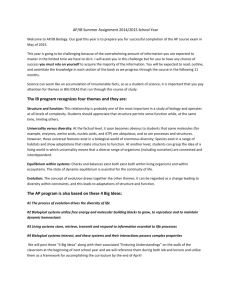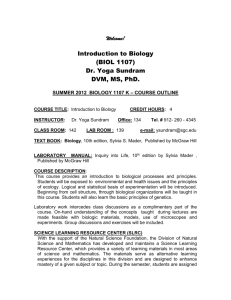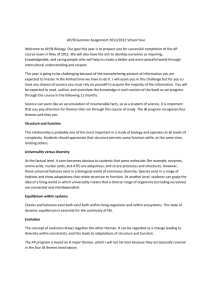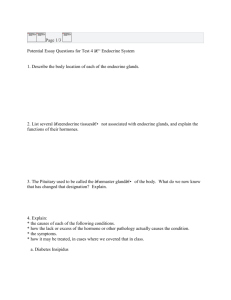Hormones and Endocrine System Chapter 42
advertisement
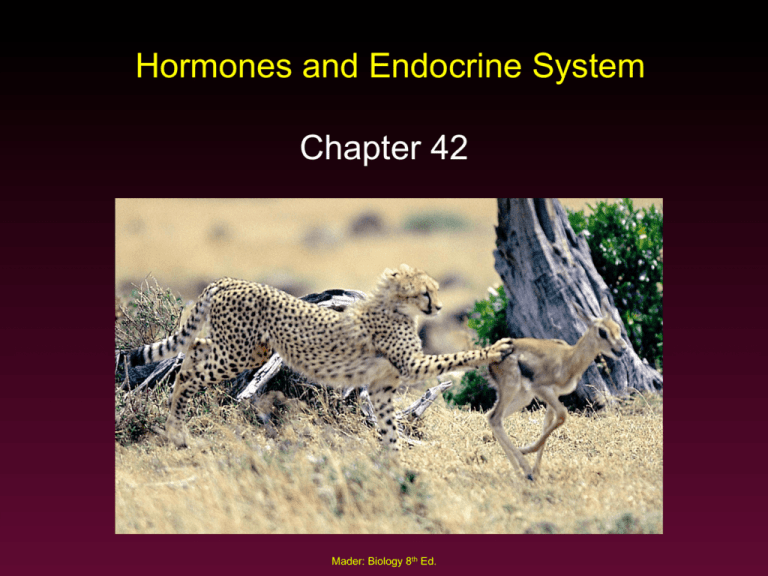
Hormones and Endocrine System Chapter 42 Mader: Biology 8th Ed. Chemical Signals • Chemical signals that act between individuals are termed pheromones. – Work at a distance between individuals, organs, or locally between adjacent cells. v Studies have shown that a woman’s axillary extract can alter another woman’s menstrual cycle by a few days. Mader: Biology 8th Ed. Chemical Signals Mader: Biology 8th Ed. Action of Hormones • Hormones are chemical signals produced by one or more cells that regulate metabolic function of other cells in the body. – Steroid Hormones v Can cross cell membranes. – Peptide Hormones v Most bind to receptor in plasma membrane. (First Messenger) Ø Produces cAMP § Second Messenger Mader: Biology 8th Ed. Figure 45.3 Mechanisms of chemical signaling: a review Mader: Biology 8th Ed. Action of Steroid Hormone Mader: Biology 8th Ed. Action of Peptide Hormone Mader: Biology 8th Ed. Human Endocrine System • Endocrine glands are ductless glands that secrete hormones directly into the bloodstream. – Most are peptide hormones. v Only gonads and adrenal cortex produce steroid hormones. – Hormone effects controlled two ways: v Negative feedback opposes release. v Antagonistic hormones oppose each other’s actions. Mader: Biology 8th Ed. Figure 45.8 Feedback control loops regulating the secretion of thyroid hormones T3 and T4 Mader: Biology 8th Ed. Figure 45.1 An example of how feedback regulation maintains homeostasis Mader: Biology 8th Ed. Figure 45.5 Human endocrine glands surveyed in this chapter Mader: Biology 8th Ed. Table 45.1 Major Vertebrate Endocrine Glands and Some of Their Hormones (Hypothalamus– Parathyroid glands) Mader: Biology 8th Ed. Table 45.1 Major Vertebrate Endocrine Glands and Some of Their Hormones (Pancreas–Thymus) Mader: Biology 8th Ed. Hypothalamus and Pituitary Gland • Hypothalamus regulates internal environment through autonomic system. – Also controls glandular secretions of pituitary gland. v Posterior Pituitary Ø Antidiuretic Hormone (ADH) § Controlled by negative feedback. Ø Oxytocin § Controlled by positive feedback. Mader: Biology 8th Ed. Hypothalamus and Pituitary Gland • Anterior Pituitary – Hypothalamus controls anterior pituitary by producing hypothalamic-releasing hormones and hypothalamic-inhibiting hormones. Mader: Biology 8th Ed. Anterior Pituitary Hormones • • Affect Other Glands – Thyroid-Stimulating Hormone (TSH) – Adrenocorticotropic Hormone (ACTH) – Gonadotropic Hormones Do Not Affect Other Glands – Prolactin (PRL) – Melanocyte-Stimulating Hormone (MSH) – Growth Hormone (GH) Mader: Biology 8th Ed. Figure 45.6a Hormones of the hypothalamus and pituitary glands Mader: Biology 8th Ed. Figure 45.6b Hormones of the hypothalamus and pituitary glands Mader: Biology 8th Ed. Effect of Growth Hormone Mader: Biology 8th Ed. Thyroid Glands • • Thyroid gland composed of large number of follicles filled with triiodothyronine (T3) and thyroxine (T4). Effect of Thyroid Hormones – Increase metabolic rate. v Simple goiter - Poor hormone production. v Cretinism - Poor thyroid development. v Myxedema - Hypothyroidism. v Exophthalmic goiter - Hyperthyroidism. Mader: Biology 8th Ed. Thyroid Malfunction Mader: Biology 8th Ed. Calcitonin • Blood calcium level is regulated in part by calcitonin. – Secreted by thyroid gland when blood calcium level rises. v Brings about deposit of calcium in the bones. – Low blood calcium level stimulates the release of parathyroid hormone (PTH). Mader: Biology 8th Ed. Parathyroid Glands • Parathyroid hormone causes the blood phosphate level to decrease and the blood calcium level to increase. – Insufficient parathyroid hormone production leads to tetany. Mader: Biology 8th Ed. Figure 45.9 Hormonal control of calcium homeostasis in mammals Mader: Biology 8th Ed. Adrenal Glands • Sit atop kidneys. – Each consists of inner portion, adrenal medulla, and outer portion, adrenal cortex. v Adrenal medulla produces epinephrine and norepinephrine. Ø Short-term response to stress. v Adrenal cortex produces mineralocorticoids and glucocorticoids. Ø Long-term response to stress. Mader: Biology 8th Ed. Adrenal Glands Mader: Biology 8th Ed. Glucocorticoids • Cortisol – Raises blood glucose level. v Promotes breakdown of muscle proteins to amino acids. v Promotes metabolism of fatty acids. – Counteracts inflammatory response. Mader: Biology 8th Ed. Mineralocorticoids • Aldosterone – Promotes renal absorption of sodium and renal excretion of potassium. – Renin-angiotensin-aldosterone system raises blood pressure. v Angiotensin II constricts arterioles. v Aldosterone causes kidneys to reabsorb sodium. – Atrial natriuretic hormone (ANH) is antagonistic to aldosterone. Mader: Biology 8th Ed. Malfunction of Adrenal Cortex • Hyposecretion - Addison disease – Bronzing of skin. Mader: Biology 8th Ed. Malfunction of Adrenal Cortex • Hypersecretion - Cushing syndrome Mader: Biology 8th Ed. • Pancreas Pancreas made up up exocrine and endocrine tissue. – Endocrine tissue, pancreatic islets, produce and secrete insulin and glucagon. v Insulin secreted during high blood glucose level. Ø Stimulates uptake of glucose by cells. v Glucagon secreted during low blood glucose level. Ø Stimulates liver to break down glycogen. Mader: Biology 8th Ed. Figure 45.10 Glucose homeostasis maintained by insulin and glucagon Mader: Biology 8th Ed. Other Endocrine Glands • Gonads – Testes v Produce testosterone Ø Secondary sex characteristics. – Ovaries v Produce estrogen and progesterone. Ø Reproduction Ø Secondary sex characteristics. Mader: Biology 8th Ed. Other Endocrine Glands • • • Pineal Gland – Produces melatonin. v Involved in Circadian rhythms. Thymus Gland – Secrete thymosins. v Aid in differentiation of lymphocytes. Prostaglandins – Produced within cells. v Not distributed in blood. Mader: Biology 8th Ed. Mader: Biology 8th Ed.
